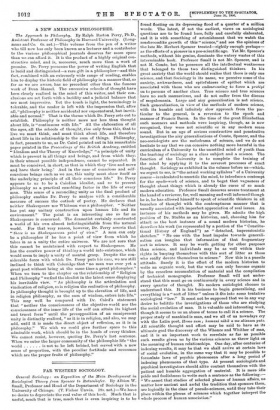FAR WESTERN SOCIOLOGY.
General Sociology : an Exposition of the Main Development in Sociological Theory from Spencer to Ratzenhofer. By Albion W. Small, Professor and Head of the Department of Sociology in the
University of Chicago. (T. Fisher Unwin. 18s. net.)—We e no desire to depreciate the real value of this book. Much that is useful, much that is true, much that is even inspiring is to bo
found floating on its depressing flood of a quarter of a million words. The latest, if not the earliest, views on sociological questions are to be found here, fully and carefully elaborated, and it is with something of astonishment that we watch the mushroomlike growth of this " science," and see the opinions of the late Mr. Herbert Spencer treated—rightly enough perhaps— as the efforts of a pioneer in a pre-scientific ago. Yet Mr. Spencer's methods, without his genius, dominate the watery wastes of this interminable book. Professor Small is not Mr. Spencer, and is not M. Comte, but ho possesses all the intellectual weaknesses that belonged to those two distinguished thinkers. In his great anxiety that the world should realise that there is only one science, and that Sociology is its name, we perceive some of the anxiety, awkwardness, and spitefulness of epithet which are associated with those who are endeavouring to force a protégé on to persons of another class. True science and true sciences have no such mannerisms, and do not suffer from the disease of megalomania. Large and airy generalisation is not science. Such generalisation, in view of the methods of modern science, with its humble and infinitely slow approach from the par- ticular to the general, is a reversion to the epoch and manner of Francis Bacon. In the time of the great Elizabethan such manners and methods were inspiring, though, as is now recognised, they were not scientific or in any modern sense sound. But in an age of serious constructive and penetrative investigations the airy generalisations of Comte, Spencer, and the neo-sociologists are the melodrama of science, and we do not hesitate to say that we can conceive nothing more harmful in the curriculum of a University to the unsettled mind of youth than the teaching of sociology as a class subject and a science. The function of the University is to complete the training of the mind by applying it to the severest processes of exact thought. Sociology as exhibited in the volume before us—which, we regret to see, is "the actual working syllabus" of a University course—is calculated to unsettle the mind, to introduce a contempt for the spade-work of science, and to beget that vagueness of thought about things which is already the curse of so much modern education. Professor Small deserves severe treatment at the hand of a reviewer, for, well meaning and well informed though he is, he has allowed himself to speak of scientific thinkers in all branches of thought with the contemptuous manner that is usually associated with imperfect appreciation of real issues. An instance of his methods may be given. He admits the high position of Dr. Stubbs as an historian, and, choosing him for attack as the best instance of a sound modern historian, he describes his work (as represented by a portion of the " Constitu- tional History of England") as " detached, impressionistic sketches." " No one with the least impulse towards generali- zation can imagine that information of that fragmentary sort is science. It may be worth getting for other purposes than science, and individuals may be as well within their rights in busying themselves with this sort of litter as those who really devote themselves to science." Now this is a puerile attitude. Surely it is the effort of the modern historian to write an organic work, but the work can only become organic by the ceaseless accumulation of material and the compilation of technical monographs. Professor Small will not under- stand that this must go on continuously in every science and in every quarter of thought. No modern sociologist chooses to understand this. It is his business to begin generalising, and everything is a " sort of litter " unless it fits into some tentative sociological "law." It must not be supposed that we in any way desire to belittle the investigations of those who are studying the social evolution of man. It is valuable and interesting work, though it seems to us an abuse of terms to call it a science. The proper study of mankind is man, and we all of us nowadays cry with the Latin poet, Homo sum; humani nihil a me alienum puto. All scientific thought and effort may be said to have as its ultimate goal the discovery of the Whence and Whither of man, and it is an important work to correlate as far as possible such results given us by the various sciences as throw light on the meaning of human relationships. One day, after centuries of indexing results, it may be that we shall arrive at certain laws of social evolution, in the same way that it may be possible to formulate laws of psychic phenomena after a long period of indexing phenomena of that type. At present sociologists and psychical investigators should alike content themselves with the patient and humble aggregation of material. It is mere idle pride and foolishness to write such a sentence as the following :- " We assert that studies of selected phases of human affairs, no matter how ancient and awful the tradition that sponsors them, are logically in the class of pseudo-sciences, until they take their place within the plexus of sciences which together interpret the whole process of human association."


























































 Previous page
Previous page